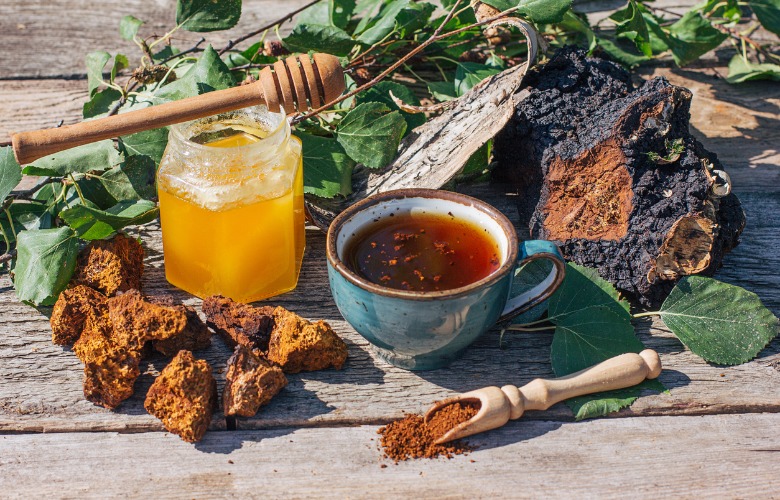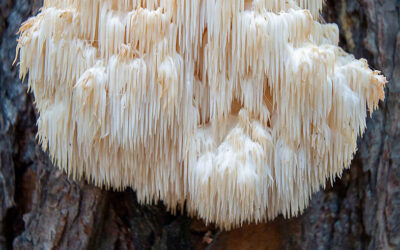5 Ways Mushrooms Boost Our Health
Types of mushrooms
Reishi
Also known as lingzhi and Ganoderma lucidum, the reishi mushroom grows in Asia and used in Eastern medicine for thousands of years. Often used as symbols of wellness and longevity, the reishi mushroom is known as “mushrooms of immortality.” Reishi mushrooms can be added to coffee or smoothies or made into a tea, and they can be used fresh and added to a variety of dishes.
Chaga
Tzar Vladimir Monamakh attributed the disappearance of his lip tumors to the Chaga mushroom in the 12th century in Russia. Later in the 26th century, Shen Nung Pen Ts’ao Ching named Chaga the “king of herbs.” Chaga mushroom is a highly nutrient-dense superfood containing vitamins and minerals. They have gained popularity in the wellness community for their health benefits and are often consumed as teas and coffees. Chaga mushrooms can also be eaten whole, made into syrups, and used in baths.
Maitake
Commonly known as “hen of the woods,” maitake mushrooms or Grifola frindosa originated in Japan. In Japanese, maitake means “dancing mushroom” and has been enjoyed in Japan for thousands of years. Once used as commerce, maitake was highly valued in Japanese – so when a Japanese commoner found it, they would dance for joy as it was as good as finding gold. Maitake mushrooms are eaten fresh and dried are well known in Japanese and Chinese medicine for their support of immune system function.
Other Types
- Button
- Chanterelles
- Cremini
- Morels
- Portobello
- Enoki
- Shiitake
- Oyster
- Porcini
1 Mental health
Research published in the Journal of Affective Disorders found that mushroom consumption is associated with a lower risk of depression and may contain bioactive compounds to reduce anxiety. This is because mushrooms contain vitamin B12, nerve growth factors, antioxidants, and anti-inflammatory properties. In addition, they have the amino acid ergothioneine, which may lower the risk of oxidative stress in high quantities.
Recently, you may have seen mushrooms making headlines as “magic mushrooms” as John Hopkins Center for Psychedelic and Consciousness, the research found that “psilocybin, a naturally occurring psychedelic compound found in ‘magic mushrooms,’ allows it to penetrate the central nervous system and the scientific and medical experts are just beginning to understand its effects on the brain and mind and its potential as therapeutics for mental illnesses.”
2 Longevity
Mushrooms have always been a part of Eastern medicines and eaten regularly as part of their cuisines for thousands of years. Mushrooms have adaptogen, and antioxidant properties – that help reduce physical and mental stress while restoring balance to the body.
Reishi is mainly known for its longevity properties, literally called “mushrooms of immortality.” Reishi interacts with several systems in the body, helping slow the aging process by reducing stress and anxiety while offering adrenal function support. They reduce inflammation in the body by supporting the immune system – Reishi mushrooms can interact with our white blood cells.
Other mushrooms that support longevity
Turkey tail – supports gut microbiome and reduces gut inflammation
Lion’s mane – stimulates the production of the myelin sheath, which fights dementia and support cognitive function, which can decline as we age
Cordyceps – used medicinally in traditional medicine for 4,000 years, cordyceps contain polysaccharides, helping balance our cortisol levels – stress is a contributing factor to aging and risk of chronic disease
3 Heart health
The nutrients and properties in mushrooms have been found to help reduce the hardening of the arteries, blood pressure, and cholesterol. This is because mushrooms contain anti-inflammatory compounds, antioxidants, and vitamins. One study showed that button mushrooms might reduce inflammation in arterial cells and prevent white cells from sticking to artery walls.
Including dietary fungi in your meals can help reduce oxidative stress and inflammation – both risk markers of chronic diseases, including cardiovascular disease or (CVD). Cardiovascular disease is still a leading cause of death in the U.S. and many other countries. Regular consumption of mushrooms can provide many health benefits, including anti-allergic, anti-tumor, anti-viral, antibacterial, antifungal, and anti-inflammatory activities.
Other ways mushrooms support heart health:
- They do contain fat
- They are high in potassium and B vitamins
- They are low in sodium, calories, and cholesterol.
4 Immune support
Ergothioneine, a powerful antioxidant, is present in mushrooms, and it helps protect from free radicals and supports immune system functions. This antioxidant is unique to mushrooms and has anti-inflammatory properties. In addition, mushrooms contain natural antibiotics that inhibit microbial growth and some fungal infections. Shiitake mushrooms contain a type of sugar molecule called lentinan, which has been found to kill viruses and microbes. Beta-glucan is found in many varieties of mushrooms and has immune-boosting properties.
Zinc, a crucial nutrient for immune system function, is in most mushrooms. Crimini mushrooms are particularly rich in zinc and a good choice for immune support.
5 Bone health
You may not think of mushrooms when you think of bone health. However, they offer many bone-supportive benefits. Studies show that mushroom consumption may decrease bone resorption and improve bone formation.
How mushrooms support bone health:
- Mushrooms are alkaline food that helps balance acidic foods, which can decrease minerals from your bones.
- The mineral copper helps produce collagen, the crucial foundation for all connective tissue, bones, and joints. Mushrooms contain copper, shitake mushrooms contain the most – 65% of the Recommended Dietary Allowance.
- Mushrooms contain zinc which helps your body stimulate the production of osteoblasts involved in building new bone and slows down the action of osteoclasts that break down the old bone.
- Selenium deficiency can contribute to the risk of osteoporosis; mushrooms are rich in selenium.
- Mushrooms contain ergosterol, a precursor to vitamin D that works with calcium to support your bone function.
How to eat mushrooms
Mushrooms can be prepared in many ways and are often used for plant-based dishes as a meat substitute for vegan and vegetarian meals. Mushrooms in the grocery store and at the farmer’s market are edible and can often be eaten raw or cooked. It is never recommended that you eat mushrooms from the wild without substantial foraging knowledge. Many mushrooms can be poisonous and look quite similar to edible mushrooms.
Soups, stir-fry, salads, sandwiches, pizza, eggs, and many more meals can be more flavorful and beneficial to your health with mushrooms added. Mushrooms can also be consumed as a functional food or a supplement dried as a powder or in a liquid elixir. These can be added to soups, teas, or coffees, depending on your preference.

Jemile earned a degree in Food Studies and Writing and has worked for almost 23 years in the medical and health industries. She has been a digital marketing consultant for Acupuncture Atlanta since 2011 as the social media manager and content manager. Writing has been a childhood dream for Jemile and writing daily for clients in the health, wellness, food, and art industries have been phenomenal. Jemile is originally from Brooklyn, NY, and lives in the Hudson Valley, NY. She lives with her husband, two daughters, her dog, and two fish. You can contact Jemile via Linkedin, her mom blog, or her website, lunaroseconsulting.com




